Australia first with plastics waste ban but incinerators threaten

Zero Waste Australia in concert with IPEN has created a webinar series aimed at steering communities back to an environmentally sound plastics waste strategy that doesn’t include waste-to-energy incineration projects, after the incineration industry seized upon a national declaration to end waste exports.
In 2019, the Council of Australian Governments (COAG) declared that waste plastic, glass, paper and tyres would no longer be exported, stating that: "The COAG waste export ban is the first step in taking responsibility for our own waste and using this resource to create jobs, spark innovation, and deliver strong environmental outcomes."
The waste industry was quick to see an opportunity. Now, much of Australia's waste will be reprocessed into Process Engineered Fuel and Refuse Derived Fuel — both mixtures of waste that include discarded material, including plastics — for continued export overseas or as fuel for paper mills, cement plants, and waste-to-energy incinerators in Australia.
Waste-to-energy incinerator projects now dominate infrastructure planning processes, with numerous projects seeking approval in every state in Australia, many of which have been fast-tracked without adequate health, environmental, and climate impact assessments. IPEN Participating Organization Zerowaste Australia has tracked the Australian incinerator projects, and is working actively with local, national, and international public interest organizations and health experts to protect communities from the toxic investment and pollution from incinerators.
More than 6 million tonnes (5.4 billion kg) of waste has been earmarked for incineration already. The climate and toxic air pollution impacts, including dioxin, as well as the toxic ash stockpiles, have been ignored in favor of jobs creation claims without care for our shared global environment.
Meanwhile the Australian Public Health Association (APHA) release in 2019 a report on the health impacts of waste incinerators. This is the largest systemic review confirms significant health impacts associated with waste incinerators.
The webinar “The Threat of Incineration”, convened by Zerowaste Australia for IPEN, includes presentations designed to inform and support front-line communities facing these projects, and provides a timely warning to plastic pollution campaigners and countries in the Asia Pacific region about the true intentions of the Australian waste export ban.
